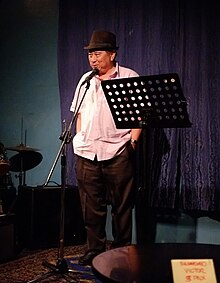Virgilio Almario
| Virgilio Almario | |
|---|---|

Virgilio Almario at a poetry reading in June 2011
|
|
| Born | Virgilio Senadrin Almario March 9, 1944 San Miguel, Bulacan, Philippine Commonwealth |
| Pen name | Rio Alma |
| Occupation | Poet, literary critic, lecturer, editor |
| Nationality | Filipino |
| Alma mater | University of the Philippines |
| Literary movement | Philippine Modernism |
| Notable awards | National Artist of the Philippines, University of the Philippines Centennial Award, Amado V. Hernandez Award, Balagtas Award for Poetry and Essay |
| Spouse | Emelina B. Soriano |
| Children | Asa Victoria, Ani Rosa, Agno Virgilio |
|
|
|
Virgilio S. Almario, (born March 9, 1944) better known by his pen name, RIO ALMA, is a Filipino artist, poet, critic, translator, editor, teacher, and cultural manager. He is a National Artist of the Philippines and currently serves as the chairman of the Komisyon sa Wikang Filipino (KWF), the government agency mandated to promote and standardize the use of the Filipino language. On January 5, 2017, Almario was also elected as the chairman of the National Commission for Culture and the Arts.
Growing up in Bulacan among peasants, Almario sought his education at Manila and completed his degree in A.B. Political Science at the University of the Philippines.
His life as a poet started when he took master’s course in education at the University of the East where he became associated with Rogelio G. Mangahas and Lamberto E. Antonio.
A prolific writer, he spearheaded the second successful modernist movement in Filipino poetry together with Rogelio Mangahas and Teo Antonio. His earliest pieces of literary criticism were collected in Ang Makata sa Panahon ng Makina (1972), now considered the first book of literary criticism in Filipino. Later, in the years of martial law, he set aside modernism and formalism and took interest in nationalism, politics and activist movement. As critic, his critical works deal with the issue of national language.
Aside from being a critic, Almario engaged in translating and editing. He has translated the best contemporary poets of the world. He has also translated for theater production the plays of Nick Joaquin, Bertolt Brecht, Euripides and Maxim Gorki. Other important translations include the famous works of the Philippines' national hero, José Rizal, namely Noli Me Tangere and El filibusterismo. For these two, he was awarded the 1999 award for translation by the Manila Critics Circle.
...
Wikipedia
